Research on Educational Leadership & its Development in Education
VerifiedAdded on 2023/06/04
|12
|3021
|450
Report
AI Summary
This research report aims to provide a relatable perspective on educational leadership and its developmental aspects within the current educational system. It develops a conceptual understanding of educational leadership, analyzes various perspectives obtained through its application, and specifies its benefits. The report addresses research questions concerning the conceptual approach, perspectives, and benefits of educational leadership. It uses a positivism research philosophy, deductive research approach, and descriptive research design. Data collection involves qualitative and quantitative methods, with ethical considerations adhering to the Data Protection Act 1998. The research also employs both primary and secondary sampling methods to gather data and perform data analysis to arrive at a conclusion about the overall development of the educational system through applied educational leadership.
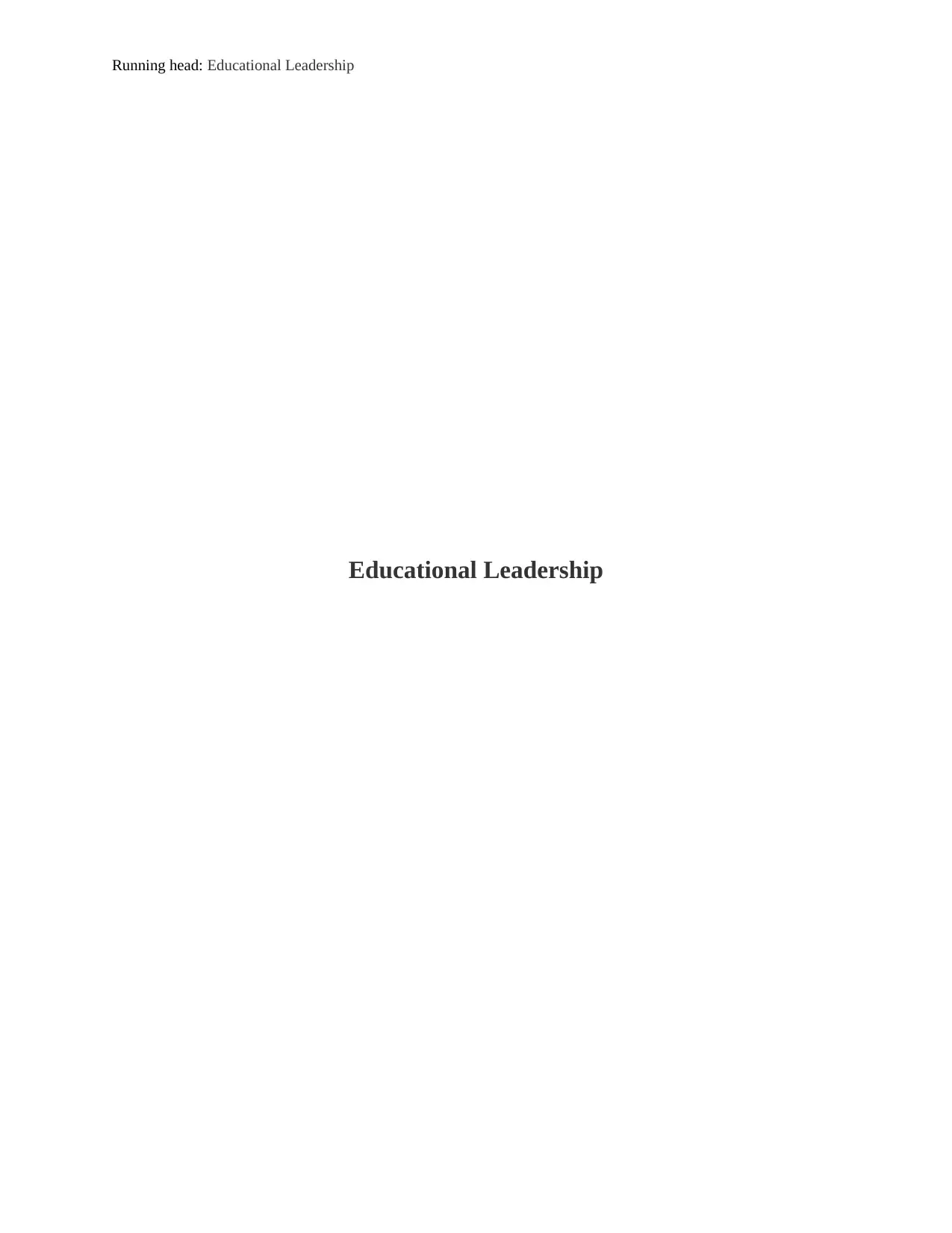
Running head: Educational Leadership
Educational Leadership
Educational Leadership
Paraphrase This Document
Need a fresh take? Get an instant paraphrase of this document with our AI Paraphraser
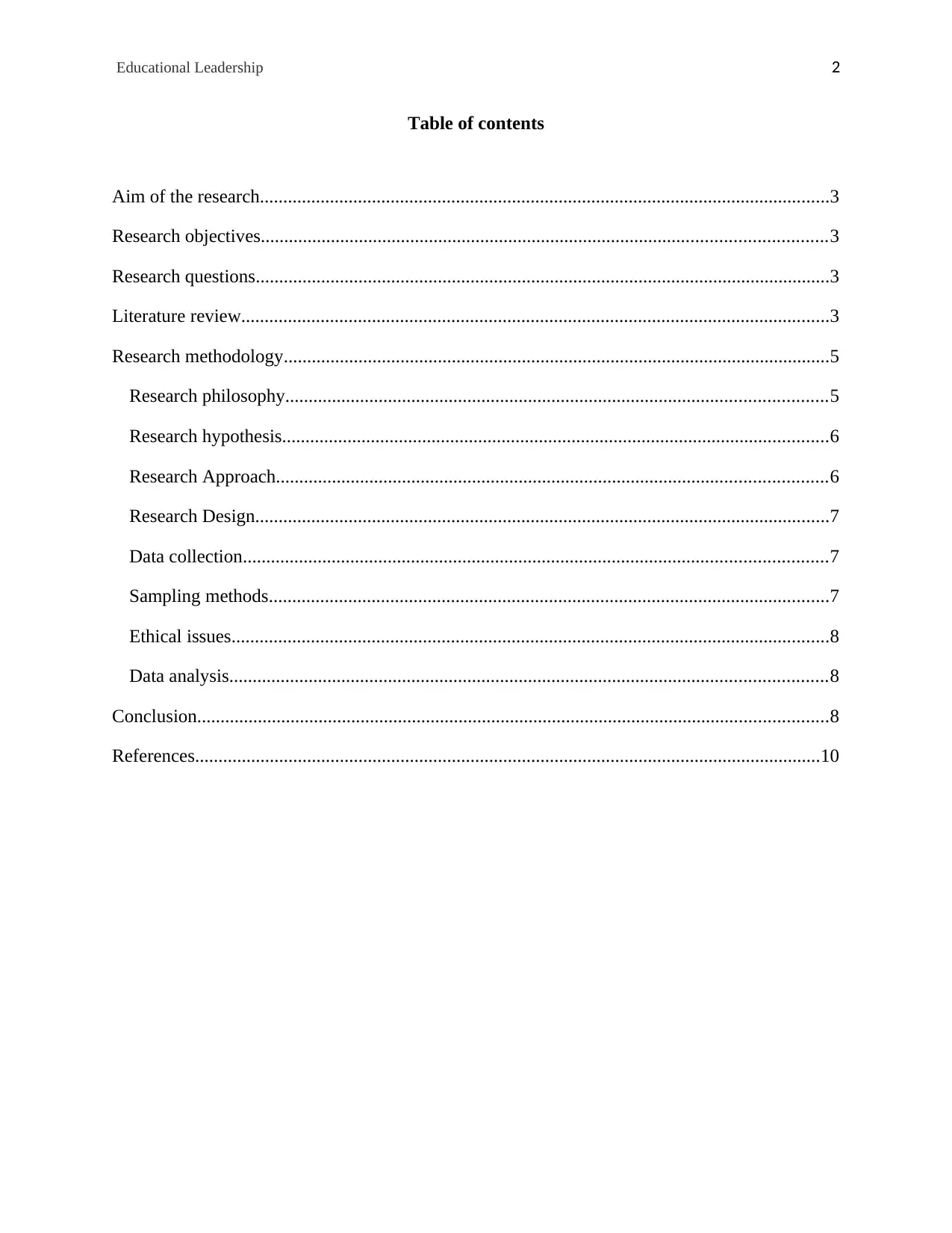
Educational Leadership 2
Table of contents
Aim of the research..........................................................................................................................3
Research objectives.........................................................................................................................3
Research questions...........................................................................................................................3
Literature review..............................................................................................................................3
Research methodology.....................................................................................................................5
Research philosophy....................................................................................................................5
Research hypothesis.....................................................................................................................6
Research Approach......................................................................................................................6
Research Design...........................................................................................................................7
Data collection.............................................................................................................................7
Sampling methods........................................................................................................................7
Ethical issues................................................................................................................................8
Data analysis................................................................................................................................8
Conclusion.......................................................................................................................................8
References......................................................................................................................................10
Table of contents
Aim of the research..........................................................................................................................3
Research objectives.........................................................................................................................3
Research questions...........................................................................................................................3
Literature review..............................................................................................................................3
Research methodology.....................................................................................................................5
Research philosophy....................................................................................................................5
Research hypothesis.....................................................................................................................6
Research Approach......................................................................................................................6
Research Design...........................................................................................................................7
Data collection.............................................................................................................................7
Sampling methods........................................................................................................................7
Ethical issues................................................................................................................................8
Data analysis................................................................................................................................8
Conclusion.......................................................................................................................................8
References......................................................................................................................................10
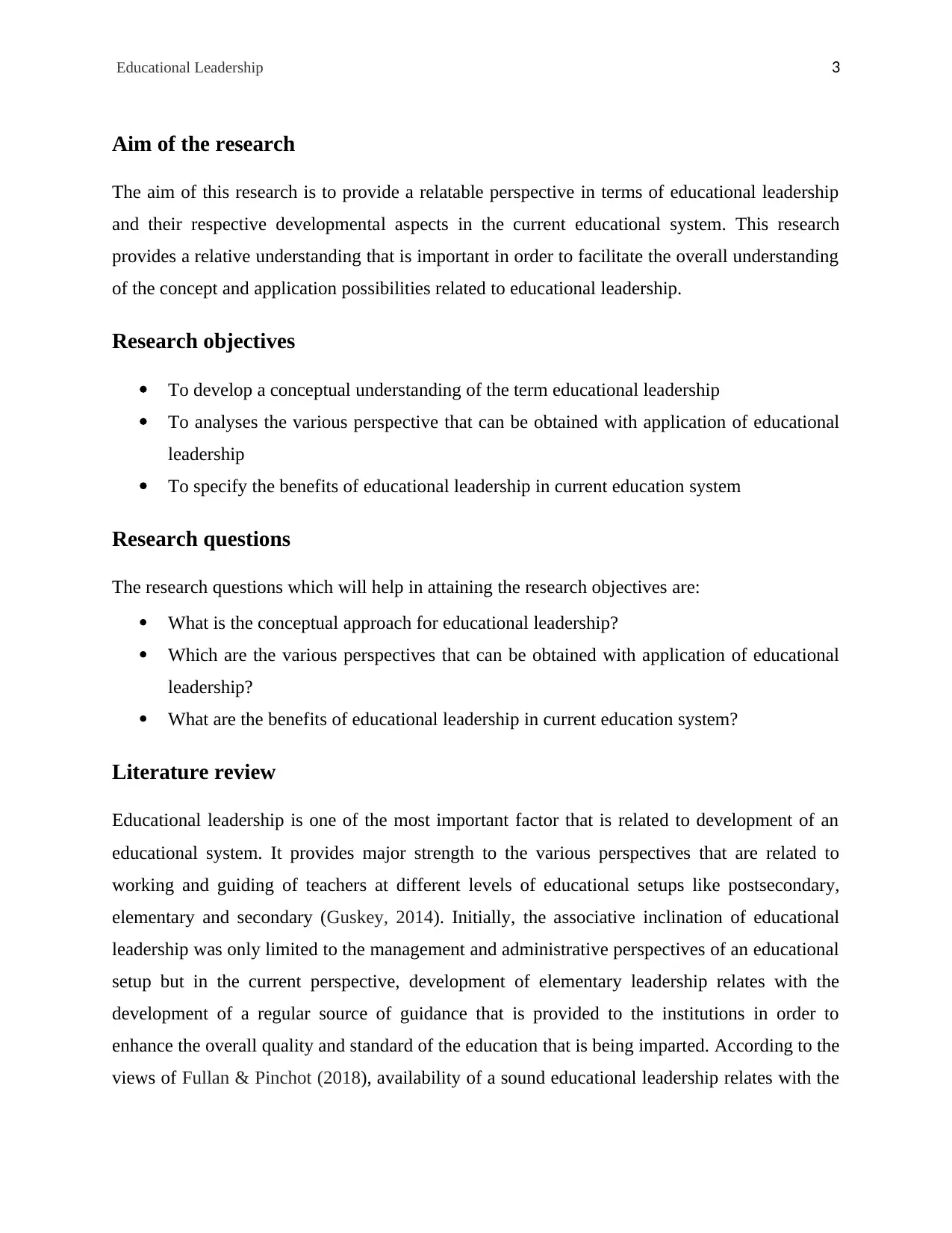
Educational Leadership 3
Aim of the research
The aim of this research is to provide a relatable perspective in terms of educational leadership
and their respective developmental aspects in the current educational system. This research
provides a relative understanding that is important in order to facilitate the overall understanding
of the concept and application possibilities related to educational leadership.
Research objectives
To develop a conceptual understanding of the term educational leadership
To analyses the various perspective that can be obtained with application of educational
leadership
To specify the benefits of educational leadership in current education system
Research questions
The research questions which will help in attaining the research objectives are:
What is the conceptual approach for educational leadership?
Which are the various perspectives that can be obtained with application of educational
leadership?
What are the benefits of educational leadership in current education system?
Literature review
Educational leadership is one of the most important factor that is related to development of an
educational system. It provides major strength to the various perspectives that are related to
working and guiding of teachers at different levels of educational setups like postsecondary,
elementary and secondary (Guskey, 2014). Initially, the associative inclination of educational
leadership was only limited to the management and administrative perspectives of an educational
setup but in the current perspective, development of elementary leadership relates with the
development of a regular source of guidance that is provided to the institutions in order to
enhance the overall quality and standard of the education that is being imparted. According to the
views of Fullan & Pinchot (2018), availability of a sound educational leadership relates with the
Aim of the research
The aim of this research is to provide a relatable perspective in terms of educational leadership
and their respective developmental aspects in the current educational system. This research
provides a relative understanding that is important in order to facilitate the overall understanding
of the concept and application possibilities related to educational leadership.
Research objectives
To develop a conceptual understanding of the term educational leadership
To analyses the various perspective that can be obtained with application of educational
leadership
To specify the benefits of educational leadership in current education system
Research questions
The research questions which will help in attaining the research objectives are:
What is the conceptual approach for educational leadership?
Which are the various perspectives that can be obtained with application of educational
leadership?
What are the benefits of educational leadership in current education system?
Literature review
Educational leadership is one of the most important factor that is related to development of an
educational system. It provides major strength to the various perspectives that are related to
working and guiding of teachers at different levels of educational setups like postsecondary,
elementary and secondary (Guskey, 2014). Initially, the associative inclination of educational
leadership was only limited to the management and administrative perspectives of an educational
setup but in the current perspective, development of elementary leadership relates with the
development of a regular source of guidance that is provided to the institutions in order to
enhance the overall quality and standard of the education that is being imparted. According to the
views of Fullan & Pinchot (2018), availability of a sound educational leadership relates with the
⊘ This is a preview!⊘
Do you want full access?
Subscribe today to unlock all pages.

Trusted by 1+ million students worldwide
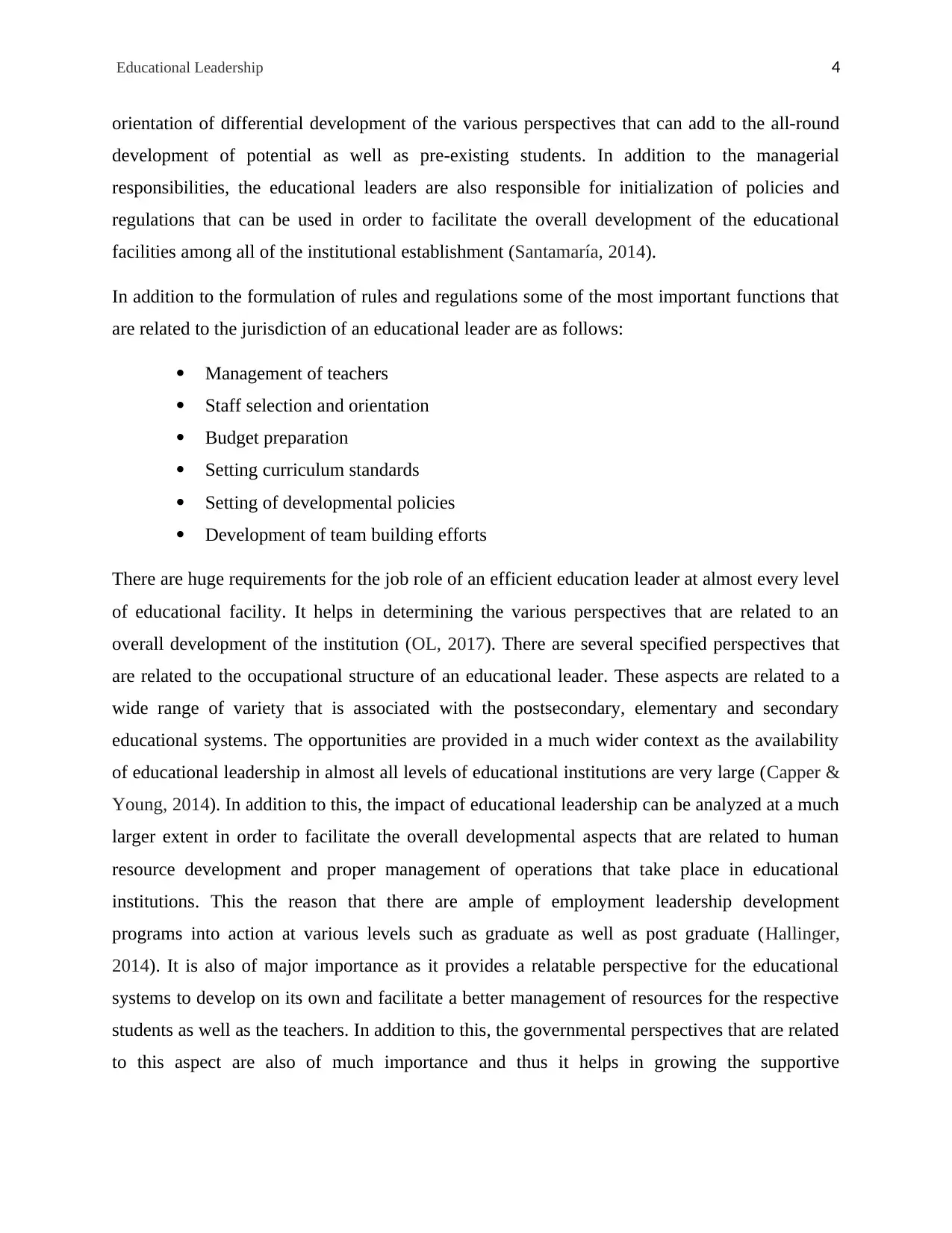
Educational Leadership 4
orientation of differential development of the various perspectives that can add to the all-round
development of potential as well as pre-existing students. In addition to the managerial
responsibilities, the educational leaders are also responsible for initialization of policies and
regulations that can be used in order to facilitate the overall development of the educational
facilities among all of the institutional establishment (Santamaría, 2014).
In addition to the formulation of rules and regulations some of the most important functions that
are related to the jurisdiction of an educational leader are as follows:
Management of teachers
Staff selection and orientation
Budget preparation
Setting curriculum standards
Setting of developmental policies
Development of team building efforts
There are huge requirements for the job role of an efficient education leader at almost every level
of educational facility. It helps in determining the various perspectives that are related to an
overall development of the institution (OL, 2017). There are several specified perspectives that
are related to the occupational structure of an educational leader. These aspects are related to a
wide range of variety that is associated with the postsecondary, elementary and secondary
educational systems. The opportunities are provided in a much wider context as the availability
of educational leadership in almost all levels of educational institutions are very large (Capper &
Young, 2014). In addition to this, the impact of educational leadership can be analyzed at a much
larger extent in order to facilitate the overall developmental aspects that are related to human
resource development and proper management of operations that take place in educational
institutions. This the reason that there are ample of employment leadership development
programs into action at various levels such as graduate as well as post graduate (Hallinger,
2014). It is also of major importance as it provides a relatable perspective for the educational
systems to develop on its own and facilitate a better management of resources for the respective
students as well as the teachers. In addition to this, the governmental perspectives that are related
to this aspect are also of much importance and thus it helps in growing the supportive
orientation of differential development of the various perspectives that can add to the all-round
development of potential as well as pre-existing students. In addition to the managerial
responsibilities, the educational leaders are also responsible for initialization of policies and
regulations that can be used in order to facilitate the overall development of the educational
facilities among all of the institutional establishment (Santamaría, 2014).
In addition to the formulation of rules and regulations some of the most important functions that
are related to the jurisdiction of an educational leader are as follows:
Management of teachers
Staff selection and orientation
Budget preparation
Setting curriculum standards
Setting of developmental policies
Development of team building efforts
There are huge requirements for the job role of an efficient education leader at almost every level
of educational facility. It helps in determining the various perspectives that are related to an
overall development of the institution (OL, 2017). There are several specified perspectives that
are related to the occupational structure of an educational leader. These aspects are related to a
wide range of variety that is associated with the postsecondary, elementary and secondary
educational systems. The opportunities are provided in a much wider context as the availability
of educational leadership in almost all levels of educational institutions are very large (Capper &
Young, 2014). In addition to this, the impact of educational leadership can be analyzed at a much
larger extent in order to facilitate the overall developmental aspects that are related to human
resource development and proper management of operations that take place in educational
institutions. This the reason that there are ample of employment leadership development
programs into action at various levels such as graduate as well as post graduate (Hallinger,
2014). It is also of major importance as it provides a relatable perspective for the educational
systems to develop on its own and facilitate a better management of resources for the respective
students as well as the teachers. In addition to this, the governmental perspectives that are related
to this aspect are also of much importance and thus it helps in growing the supportive
Paraphrase This Document
Need a fresh take? Get an instant paraphrase of this document with our AI Paraphraser
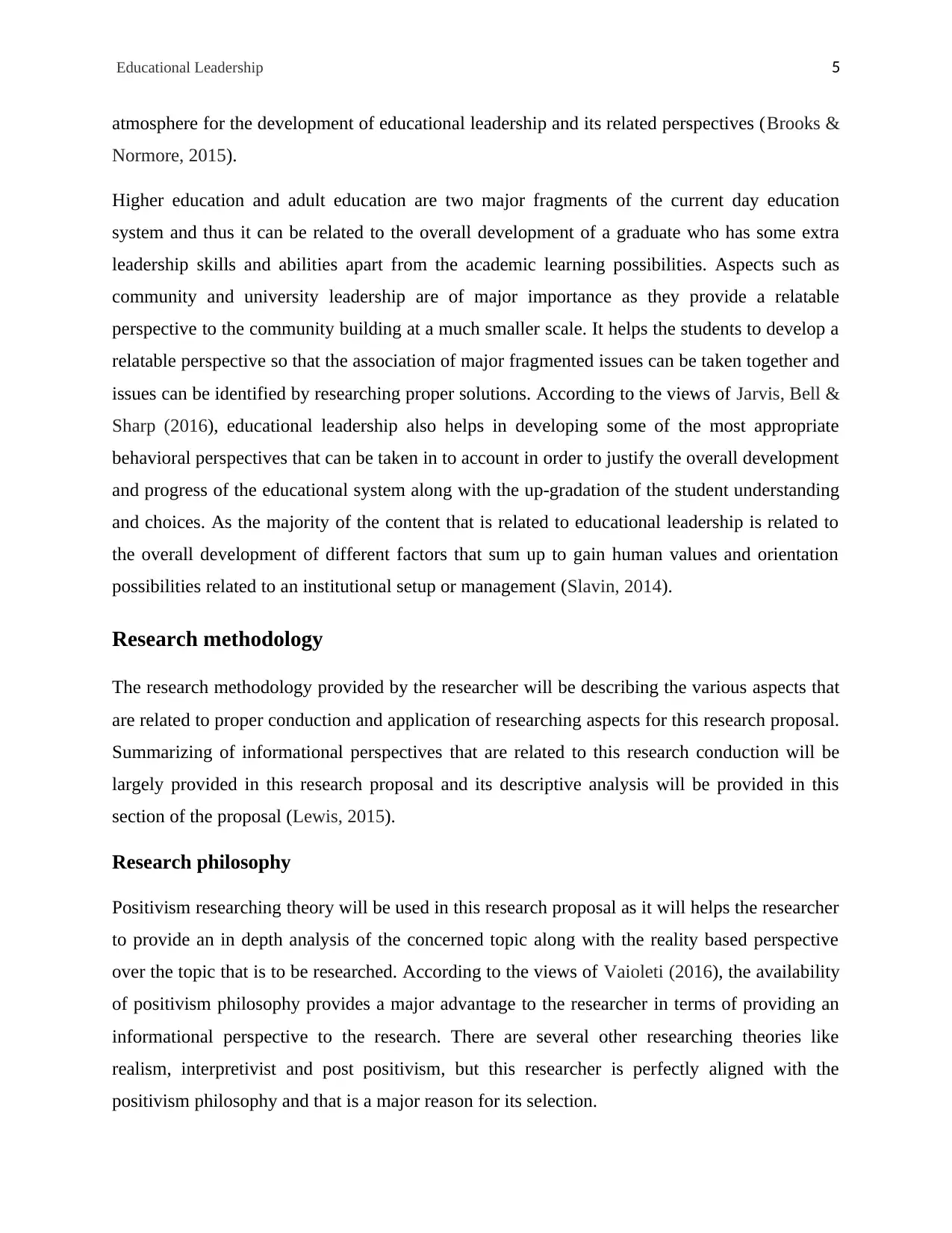
Educational Leadership 5
atmosphere for the development of educational leadership and its related perspectives (Brooks &
Normore, 2015).
Higher education and adult education are two major fragments of the current day education
system and thus it can be related to the overall development of a graduate who has some extra
leadership skills and abilities apart from the academic learning possibilities. Aspects such as
community and university leadership are of major importance as they provide a relatable
perspective to the community building at a much smaller scale. It helps the students to develop a
relatable perspective so that the association of major fragmented issues can be taken together and
issues can be identified by researching proper solutions. According to the views of Jarvis, Bell &
Sharp (2016), educational leadership also helps in developing some of the most appropriate
behavioral perspectives that can be taken in to account in order to justify the overall development
and progress of the educational system along with the up-gradation of the student understanding
and choices. As the majority of the content that is related to educational leadership is related to
the overall development of different factors that sum up to gain human values and orientation
possibilities related to an institutional setup or management (Slavin, 2014).
Research methodology
The research methodology provided by the researcher will be describing the various aspects that
are related to proper conduction and application of researching aspects for this research proposal.
Summarizing of informational perspectives that are related to this research conduction will be
largely provided in this research proposal and its descriptive analysis will be provided in this
section of the proposal (Lewis, 2015).
Research philosophy
Positivism researching theory will be used in this research proposal as it will helps the researcher
to provide an in depth analysis of the concerned topic along with the reality based perspective
over the topic that is to be researched. According to the views of Vaioleti (2016), the availability
of positivism philosophy provides a major advantage to the researcher in terms of providing an
informational perspective to the research. There are several other researching theories like
realism, interpretivist and post positivism, but this researcher is perfectly aligned with the
positivism philosophy and that is a major reason for its selection.
atmosphere for the development of educational leadership and its related perspectives (Brooks &
Normore, 2015).
Higher education and adult education are two major fragments of the current day education
system and thus it can be related to the overall development of a graduate who has some extra
leadership skills and abilities apart from the academic learning possibilities. Aspects such as
community and university leadership are of major importance as they provide a relatable
perspective to the community building at a much smaller scale. It helps the students to develop a
relatable perspective so that the association of major fragmented issues can be taken together and
issues can be identified by researching proper solutions. According to the views of Jarvis, Bell &
Sharp (2016), educational leadership also helps in developing some of the most appropriate
behavioral perspectives that can be taken in to account in order to justify the overall development
and progress of the educational system along with the up-gradation of the student understanding
and choices. As the majority of the content that is related to educational leadership is related to
the overall development of different factors that sum up to gain human values and orientation
possibilities related to an institutional setup or management (Slavin, 2014).
Research methodology
The research methodology provided by the researcher will be describing the various aspects that
are related to proper conduction and application of researching aspects for this research proposal.
Summarizing of informational perspectives that are related to this research conduction will be
largely provided in this research proposal and its descriptive analysis will be provided in this
section of the proposal (Lewis, 2015).
Research philosophy
Positivism researching theory will be used in this research proposal as it will helps the researcher
to provide an in depth analysis of the concerned topic along with the reality based perspective
over the topic that is to be researched. According to the views of Vaioleti (2016), the availability
of positivism philosophy provides a major advantage to the researcher in terms of providing an
informational perspective to the research. There are several other researching theories like
realism, interpretivist and post positivism, but this researcher is perfectly aligned with the
positivism philosophy and that is a major reason for its selection.
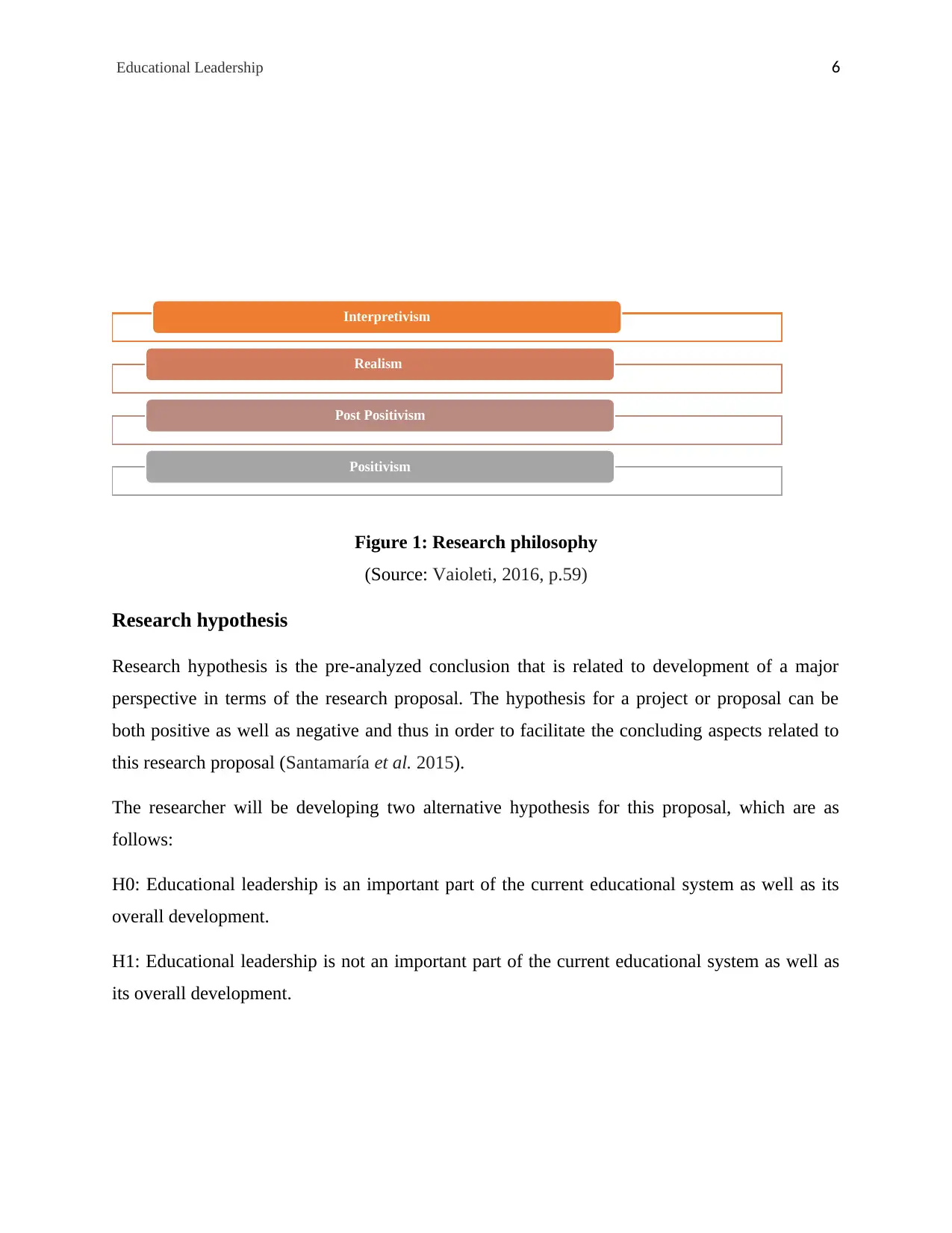
Educational Leadership 6
Figure 1: Research philosophy
(Source: Vaioleti, 2016, p.59)
Research hypothesis
Research hypothesis is the pre-analyzed conclusion that is related to development of a major
perspective in terms of the research proposal. The hypothesis for a project or proposal can be
both positive as well as negative and thus in order to facilitate the concluding aspects related to
this research proposal (Santamaría et al. 2015).
The researcher will be developing two alternative hypothesis for this proposal, which are as
follows:
H0: Educational leadership is an important part of the current educational system as well as its
overall development.
H1: Educational leadership is not an important part of the current educational system as well as
its overall development.
Interpretivism
Realism
Post Positivism
Positivism
Figure 1: Research philosophy
(Source: Vaioleti, 2016, p.59)
Research hypothesis
Research hypothesis is the pre-analyzed conclusion that is related to development of a major
perspective in terms of the research proposal. The hypothesis for a project or proposal can be
both positive as well as negative and thus in order to facilitate the concluding aspects related to
this research proposal (Santamaría et al. 2015).
The researcher will be developing two alternative hypothesis for this proposal, which are as
follows:
H0: Educational leadership is an important part of the current educational system as well as its
overall development.
H1: Educational leadership is not an important part of the current educational system as well as
its overall development.
Interpretivism
Realism
Post Positivism
Positivism
⊘ This is a preview!⊘
Do you want full access?
Subscribe today to unlock all pages.

Trusted by 1+ million students worldwide
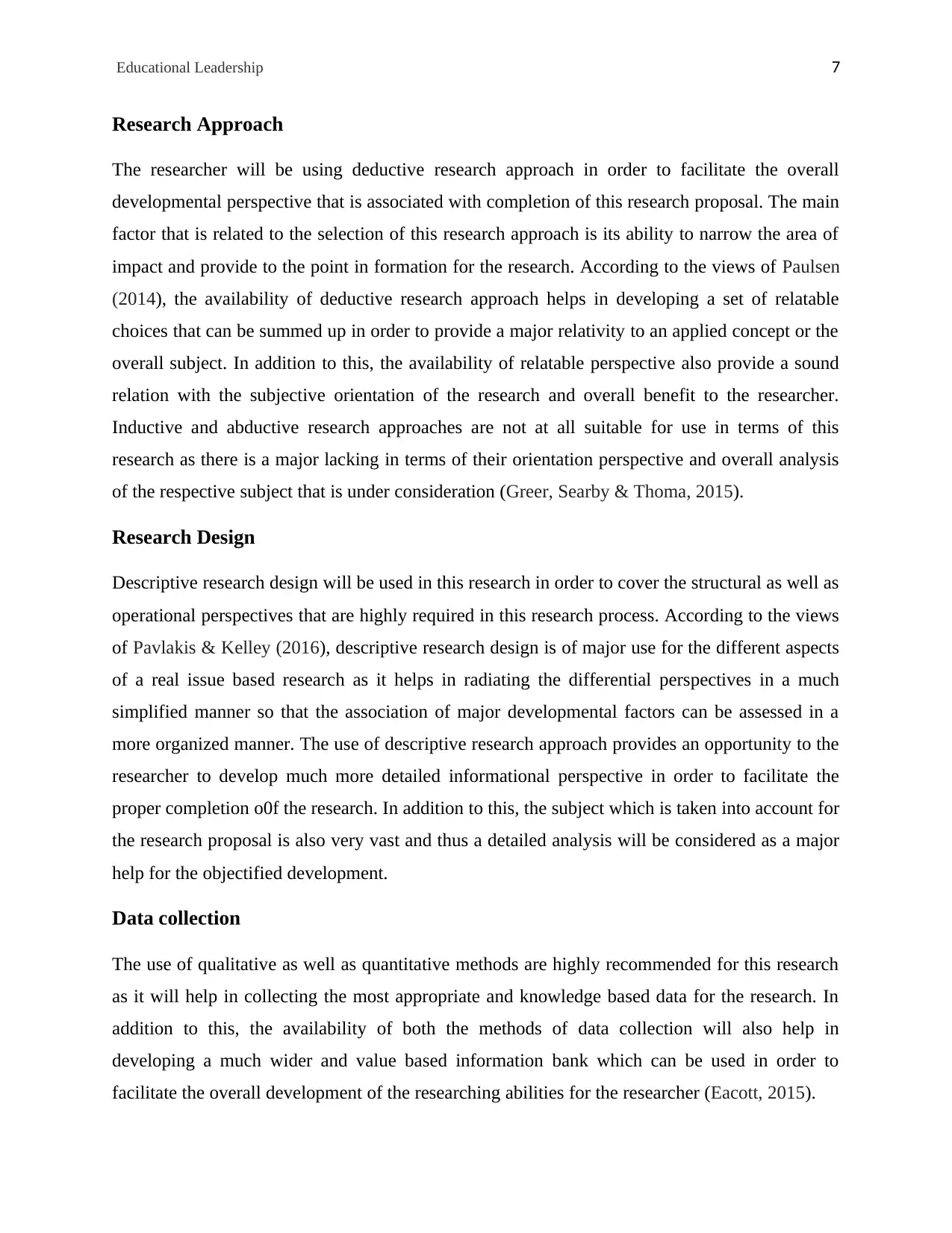
Educational Leadership 7
Research Approach
The researcher will be using deductive research approach in order to facilitate the overall
developmental perspective that is associated with completion of this research proposal. The main
factor that is related to the selection of this research approach is its ability to narrow the area of
impact and provide to the point in formation for the research. According to the views of Paulsen
(2014), the availability of deductive research approach helps in developing a set of relatable
choices that can be summed up in order to provide a major relativity to an applied concept or the
overall subject. In addition to this, the availability of relatable perspective also provide a sound
relation with the subjective orientation of the research and overall benefit to the researcher.
Inductive and abductive research approaches are not at all suitable for use in terms of this
research as there is a major lacking in terms of their orientation perspective and overall analysis
of the respective subject that is under consideration (Greer, Searby & Thoma, 2015).
Research Design
Descriptive research design will be used in this research in order to cover the structural as well as
operational perspectives that are highly required in this research process. According to the views
of Pavlakis & Kelley (2016), descriptive research design is of major use for the different aspects
of a real issue based research as it helps in radiating the differential perspectives in a much
simplified manner so that the association of major developmental factors can be assessed in a
more organized manner. The use of descriptive research approach provides an opportunity to the
researcher to develop much more detailed informational perspective in order to facilitate the
proper completion o0f the research. In addition to this, the subject which is taken into account for
the research proposal is also very vast and thus a detailed analysis will be considered as a major
help for the objectified development.
Data collection
The use of qualitative as well as quantitative methods are highly recommended for this research
as it will help in collecting the most appropriate and knowledge based data for the research. In
addition to this, the availability of both the methods of data collection will also help in
developing a much wider and value based information bank which can be used in order to
facilitate the overall development of the researching abilities for the researcher (Eacott, 2015).
Research Approach
The researcher will be using deductive research approach in order to facilitate the overall
developmental perspective that is associated with completion of this research proposal. The main
factor that is related to the selection of this research approach is its ability to narrow the area of
impact and provide to the point in formation for the research. According to the views of Paulsen
(2014), the availability of deductive research approach helps in developing a set of relatable
choices that can be summed up in order to provide a major relativity to an applied concept or the
overall subject. In addition to this, the availability of relatable perspective also provide a sound
relation with the subjective orientation of the research and overall benefit to the researcher.
Inductive and abductive research approaches are not at all suitable for use in terms of this
research as there is a major lacking in terms of their orientation perspective and overall analysis
of the respective subject that is under consideration (Greer, Searby & Thoma, 2015).
Research Design
Descriptive research design will be used in this research in order to cover the structural as well as
operational perspectives that are highly required in this research process. According to the views
of Pavlakis & Kelley (2016), descriptive research design is of major use for the different aspects
of a real issue based research as it helps in radiating the differential perspectives in a much
simplified manner so that the association of major developmental factors can be assessed in a
more organized manner. The use of descriptive research approach provides an opportunity to the
researcher to develop much more detailed informational perspective in order to facilitate the
proper completion o0f the research. In addition to this, the subject which is taken into account for
the research proposal is also very vast and thus a detailed analysis will be considered as a major
help for the objectified development.
Data collection
The use of qualitative as well as quantitative methods are highly recommended for this research
as it will help in collecting the most appropriate and knowledge based data for the research. In
addition to this, the availability of both the methods of data collection will also help in
developing a much wider and value based information bank which can be used in order to
facilitate the overall development of the researching abilities for the researcher (Eacott, 2015).
Paraphrase This Document
Need a fresh take? Get an instant paraphrase of this document with our AI Paraphraser
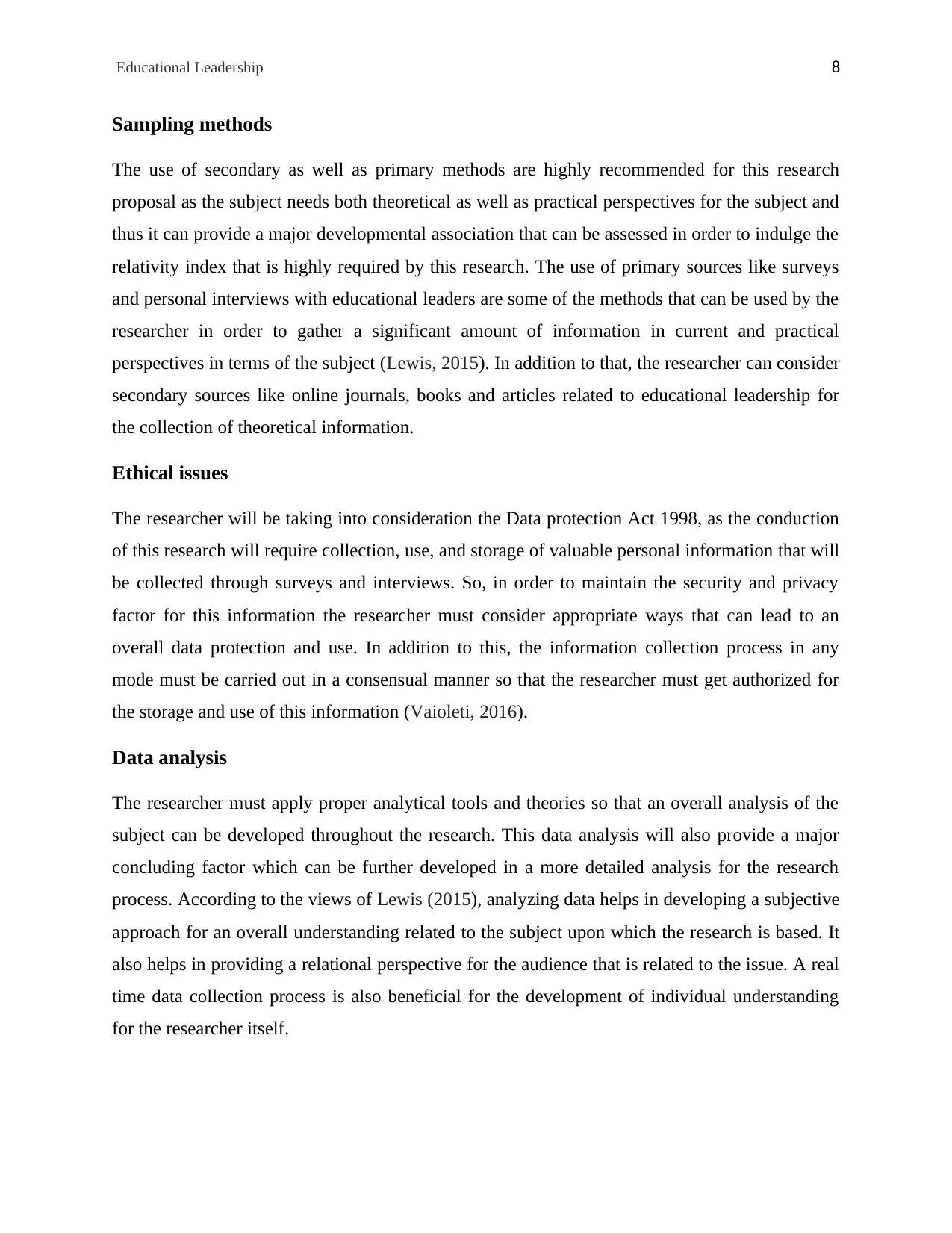
Educational Leadership 8
Sampling methods
The use of secondary as well as primary methods are highly recommended for this research
proposal as the subject needs both theoretical as well as practical perspectives for the subject and
thus it can provide a major developmental association that can be assessed in order to indulge the
relativity index that is highly required by this research. The use of primary sources like surveys
and personal interviews with educational leaders are some of the methods that can be used by the
researcher in order to gather a significant amount of information in current and practical
perspectives in terms of the subject (Lewis, 2015). In addition to that, the researcher can consider
secondary sources like online journals, books and articles related to educational leadership for
the collection of theoretical information.
Ethical issues
The researcher will be taking into consideration the Data protection Act 1998, as the conduction
of this research will require collection, use, and storage of valuable personal information that will
be collected through surveys and interviews. So, in order to maintain the security and privacy
factor for this information the researcher must consider appropriate ways that can lead to an
overall data protection and use. In addition to this, the information collection process in any
mode must be carried out in a consensual manner so that the researcher must get authorized for
the storage and use of this information (Vaioleti, 2016).
Data analysis
The researcher must apply proper analytical tools and theories so that an overall analysis of the
subject can be developed throughout the research. This data analysis will also provide a major
concluding factor which can be further developed in a more detailed analysis for the research
process. According to the views of Lewis (2015), analyzing data helps in developing a subjective
approach for an overall understanding related to the subject upon which the research is based. It
also helps in providing a relational perspective for the audience that is related to the issue. A real
time data collection process is also beneficial for the development of individual understanding
for the researcher itself.
Sampling methods
The use of secondary as well as primary methods are highly recommended for this research
proposal as the subject needs both theoretical as well as practical perspectives for the subject and
thus it can provide a major developmental association that can be assessed in order to indulge the
relativity index that is highly required by this research. The use of primary sources like surveys
and personal interviews with educational leaders are some of the methods that can be used by the
researcher in order to gather a significant amount of information in current and practical
perspectives in terms of the subject (Lewis, 2015). In addition to that, the researcher can consider
secondary sources like online journals, books and articles related to educational leadership for
the collection of theoretical information.
Ethical issues
The researcher will be taking into consideration the Data protection Act 1998, as the conduction
of this research will require collection, use, and storage of valuable personal information that will
be collected through surveys and interviews. So, in order to maintain the security and privacy
factor for this information the researcher must consider appropriate ways that can lead to an
overall data protection and use. In addition to this, the information collection process in any
mode must be carried out in a consensual manner so that the researcher must get authorized for
the storage and use of this information (Vaioleti, 2016).
Data analysis
The researcher must apply proper analytical tools and theories so that an overall analysis of the
subject can be developed throughout the research. This data analysis will also provide a major
concluding factor which can be further developed in a more detailed analysis for the research
process. According to the views of Lewis (2015), analyzing data helps in developing a subjective
approach for an overall understanding related to the subject upon which the research is based. It
also helps in providing a relational perspective for the audience that is related to the issue. A real
time data collection process is also beneficial for the development of individual understanding
for the researcher itself.
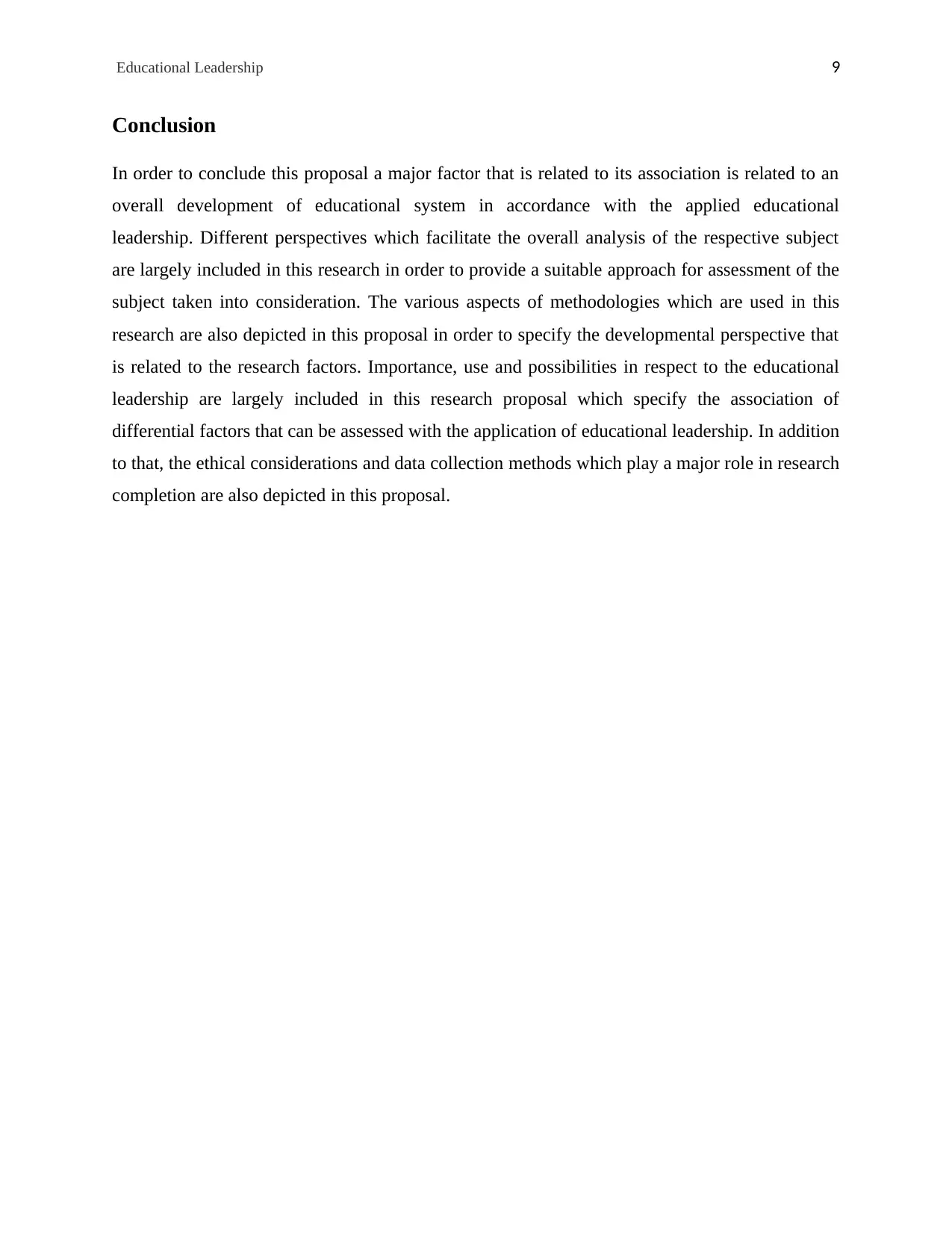
Educational Leadership 9
Conclusion
In order to conclude this proposal a major factor that is related to its association is related to an
overall development of educational system in accordance with the applied educational
leadership. Different perspectives which facilitate the overall analysis of the respective subject
are largely included in this research in order to provide a suitable approach for assessment of the
subject taken into consideration. The various aspects of methodologies which are used in this
research are also depicted in this proposal in order to specify the developmental perspective that
is related to the research factors. Importance, use and possibilities in respect to the educational
leadership are largely included in this research proposal which specify the association of
differential factors that can be assessed with the application of educational leadership. In addition
to that, the ethical considerations and data collection methods which play a major role in research
completion are also depicted in this proposal.
Conclusion
In order to conclude this proposal a major factor that is related to its association is related to an
overall development of educational system in accordance with the applied educational
leadership. Different perspectives which facilitate the overall analysis of the respective subject
are largely included in this research in order to provide a suitable approach for assessment of the
subject taken into consideration. The various aspects of methodologies which are used in this
research are also depicted in this proposal in order to specify the developmental perspective that
is related to the research factors. Importance, use and possibilities in respect to the educational
leadership are largely included in this research proposal which specify the association of
differential factors that can be assessed with the application of educational leadership. In addition
to that, the ethical considerations and data collection methods which play a major role in research
completion are also depicted in this proposal.
⊘ This is a preview!⊘
Do you want full access?
Subscribe today to unlock all pages.

Trusted by 1+ million students worldwide
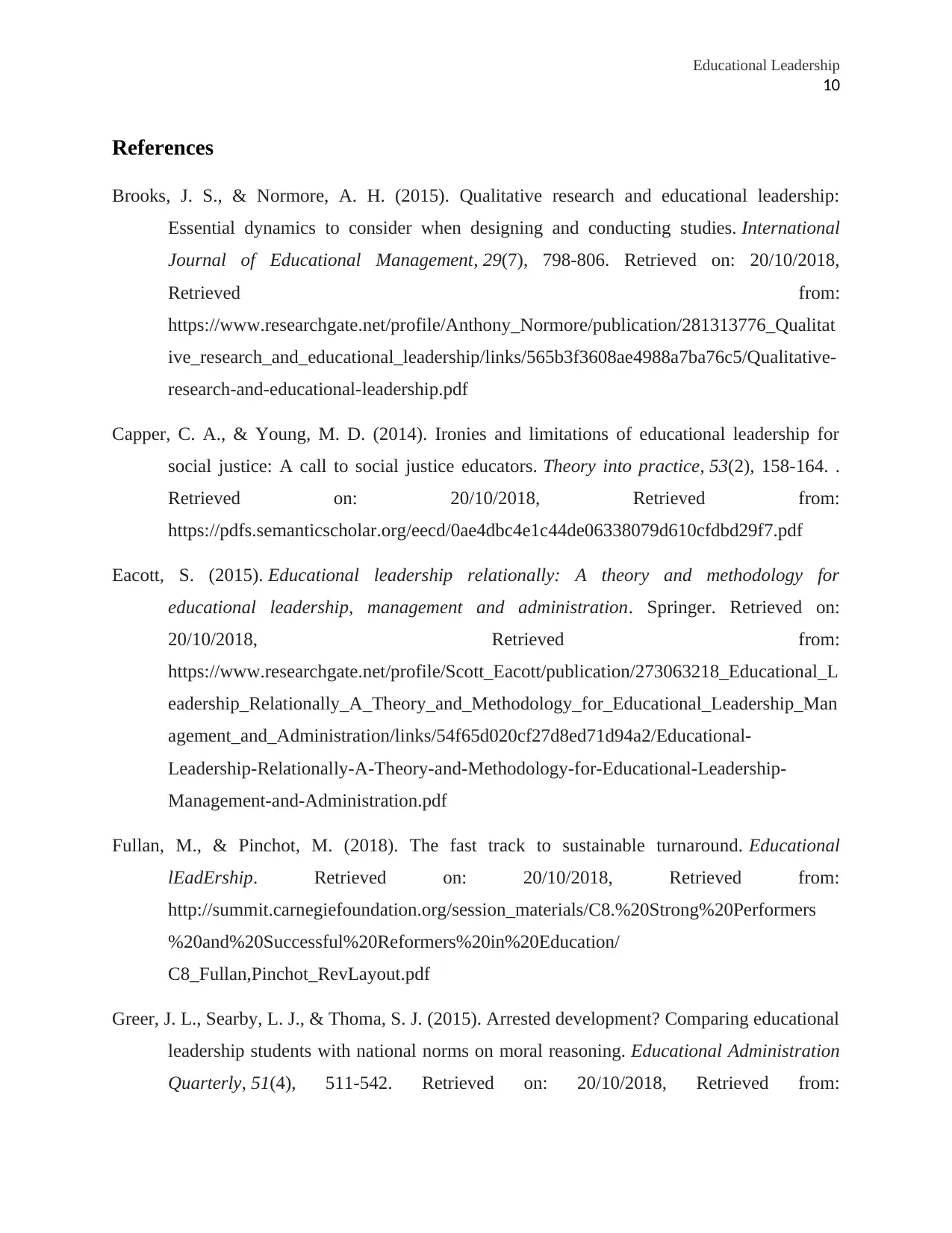
Educational Leadership
10
References
Brooks, J. S., & Normore, A. H. (2015). Qualitative research and educational leadership:
Essential dynamics to consider when designing and conducting studies. International
Journal of Educational Management, 29(7), 798-806. Retrieved on: 20/10/2018,
Retrieved from:
https://www.researchgate.net/profile/Anthony_Normore/publication/281313776_Qualitat
ive_research_and_educational_leadership/links/565b3f3608ae4988a7ba76c5/Qualitative-
research-and-educational-leadership.pdf
Capper, C. A., & Young, M. D. (2014). Ironies and limitations of educational leadership for
social justice: A call to social justice educators. Theory into practice, 53(2), 158-164. .
Retrieved on: 20/10/2018, Retrieved from:
https://pdfs.semanticscholar.org/eecd/0ae4dbc4e1c44de06338079d610cfdbd29f7.pdf
Eacott, S. (2015). Educational leadership relationally: A theory and methodology for
educational leadership, management and administration. Springer. Retrieved on:
20/10/2018, Retrieved from:
https://www.researchgate.net/profile/Scott_Eacott/publication/273063218_Educational_L
eadership_Relationally_A_Theory_and_Methodology_for_Educational_Leadership_Man
agement_and_Administration/links/54f65d020cf27d8ed71d94a2/Educational-
Leadership-Relationally-A-Theory-and-Methodology-for-Educational-Leadership-
Management-and-Administration.pdf
Fullan, M., & Pinchot, M. (2018). The fast track to sustainable turnaround. Educational
lEadErship. Retrieved on: 20/10/2018, Retrieved from:
http://summit.carnegiefoundation.org/session_materials/C8.%20Strong%20Performers
%20and%20Successful%20Reformers%20in%20Education/
C8_Fullan,Pinchot_RevLayout.pdf
Greer, J. L., Searby, L. J., & Thoma, S. J. (2015). Arrested development? Comparing educational
leadership students with national norms on moral reasoning. Educational Administration
Quarterly, 51(4), 511-542. Retrieved on: 20/10/2018, Retrieved from:
10
References
Brooks, J. S., & Normore, A. H. (2015). Qualitative research and educational leadership:
Essential dynamics to consider when designing and conducting studies. International
Journal of Educational Management, 29(7), 798-806. Retrieved on: 20/10/2018,
Retrieved from:
https://www.researchgate.net/profile/Anthony_Normore/publication/281313776_Qualitat
ive_research_and_educational_leadership/links/565b3f3608ae4988a7ba76c5/Qualitative-
research-and-educational-leadership.pdf
Capper, C. A., & Young, M. D. (2014). Ironies and limitations of educational leadership for
social justice: A call to social justice educators. Theory into practice, 53(2), 158-164. .
Retrieved on: 20/10/2018, Retrieved from:
https://pdfs.semanticscholar.org/eecd/0ae4dbc4e1c44de06338079d610cfdbd29f7.pdf
Eacott, S. (2015). Educational leadership relationally: A theory and methodology for
educational leadership, management and administration. Springer. Retrieved on:
20/10/2018, Retrieved from:
https://www.researchgate.net/profile/Scott_Eacott/publication/273063218_Educational_L
eadership_Relationally_A_Theory_and_Methodology_for_Educational_Leadership_Man
agement_and_Administration/links/54f65d020cf27d8ed71d94a2/Educational-
Leadership-Relationally-A-Theory-and-Methodology-for-Educational-Leadership-
Management-and-Administration.pdf
Fullan, M., & Pinchot, M. (2018). The fast track to sustainable turnaround. Educational
lEadErship. Retrieved on: 20/10/2018, Retrieved from:
http://summit.carnegiefoundation.org/session_materials/C8.%20Strong%20Performers
%20and%20Successful%20Reformers%20in%20Education/
C8_Fullan,Pinchot_RevLayout.pdf
Greer, J. L., Searby, L. J., & Thoma, S. J. (2015). Arrested development? Comparing educational
leadership students with national norms on moral reasoning. Educational Administration
Quarterly, 51(4), 511-542. Retrieved on: 20/10/2018, Retrieved from:
Paraphrase This Document
Need a fresh take? Get an instant paraphrase of this document with our AI Paraphraser
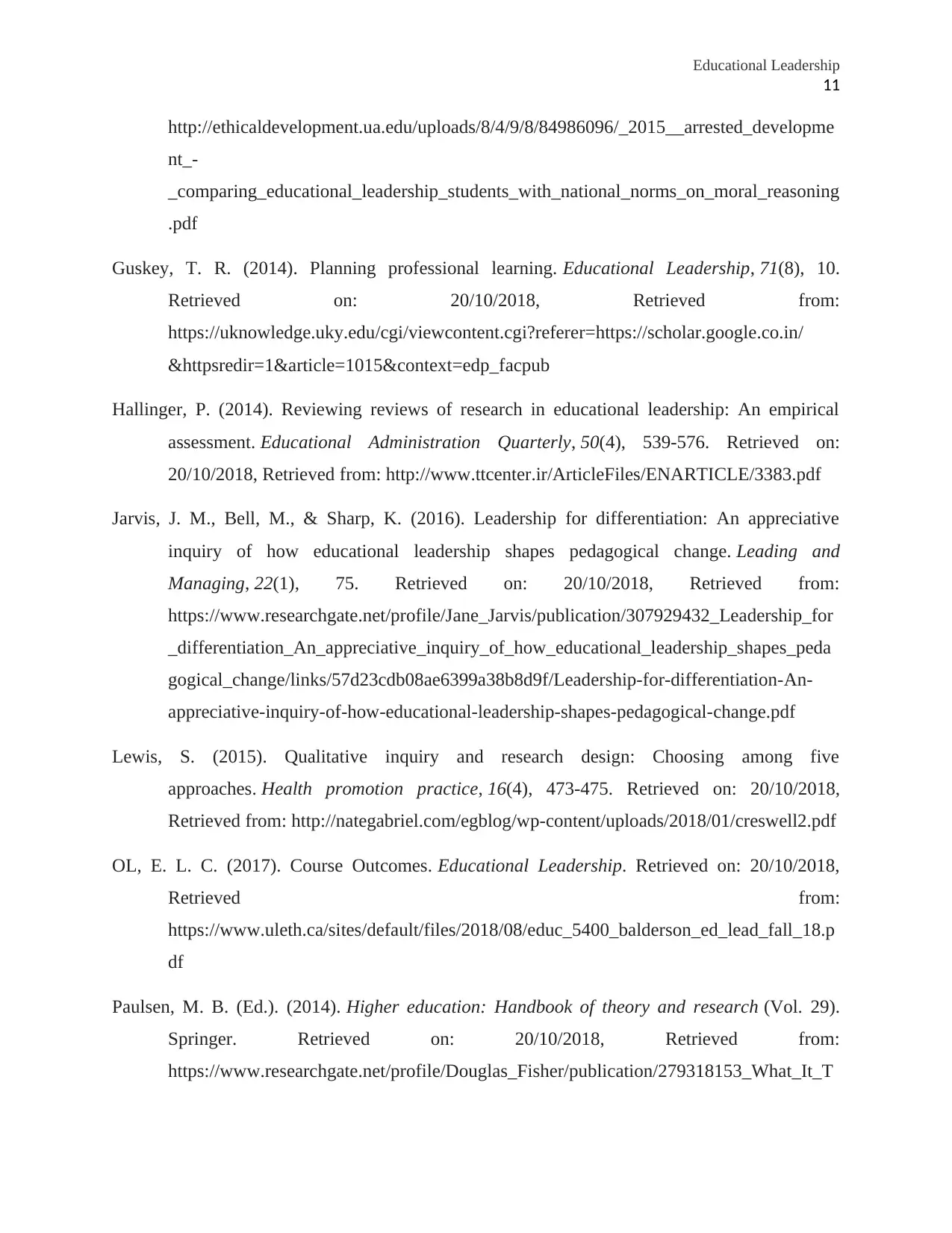
Educational Leadership
11
http://ethicaldevelopment.ua.edu/uploads/8/4/9/8/84986096/_2015__arrested_developme
nt_-
_comparing_educational_leadership_students_with_national_norms_on_moral_reasoning
.pdf
Guskey, T. R. (2014). Planning professional learning. Educational Leadership, 71(8), 10.
Retrieved on: 20/10/2018, Retrieved from:
https://uknowledge.uky.edu/cgi/viewcontent.cgi?referer=https://scholar.google.co.in/
&httpsredir=1&article=1015&context=edp_facpub
Hallinger, P. (2014). Reviewing reviews of research in educational leadership: An empirical
assessment. Educational Administration Quarterly, 50(4), 539-576. Retrieved on:
20/10/2018, Retrieved from: http://www.ttcenter.ir/ArticleFiles/ENARTICLE/3383.pdf
Jarvis, J. M., Bell, M., & Sharp, K. (2016). Leadership for differentiation: An appreciative
inquiry of how educational leadership shapes pedagogical change. Leading and
Managing, 22(1), 75. Retrieved on: 20/10/2018, Retrieved from:
https://www.researchgate.net/profile/Jane_Jarvis/publication/307929432_Leadership_for
_differentiation_An_appreciative_inquiry_of_how_educational_leadership_shapes_peda
gogical_change/links/57d23cdb08ae6399a38b8d9f/Leadership-for-differentiation-An-
appreciative-inquiry-of-how-educational-leadership-shapes-pedagogical-change.pdf
Lewis, S. (2015). Qualitative inquiry and research design: Choosing among five
approaches. Health promotion practice, 16(4), 473-475. Retrieved on: 20/10/2018,
Retrieved from: http://nategabriel.com/egblog/wp-content/uploads/2018/01/creswell2.pdf
OL, E. L. C. (2017). Course Outcomes. Educational Leadership. Retrieved on: 20/10/2018,
Retrieved from:
https://www.uleth.ca/sites/default/files/2018/08/educ_5400_balderson_ed_lead_fall_18.p
df
Paulsen, M. B. (Ed.). (2014). Higher education: Handbook of theory and research (Vol. 29).
Springer. Retrieved on: 20/10/2018, Retrieved from:
https://www.researchgate.net/profile/Douglas_Fisher/publication/279318153_What_It_T
11
http://ethicaldevelopment.ua.edu/uploads/8/4/9/8/84986096/_2015__arrested_developme
nt_-
_comparing_educational_leadership_students_with_national_norms_on_moral_reasoning
Guskey, T. R. (2014). Planning professional learning. Educational Leadership, 71(8), 10.
Retrieved on: 20/10/2018, Retrieved from:
https://uknowledge.uky.edu/cgi/viewcontent.cgi?referer=https://scholar.google.co.in/
&httpsredir=1&article=1015&context=edp_facpub
Hallinger, P. (2014). Reviewing reviews of research in educational leadership: An empirical
assessment. Educational Administration Quarterly, 50(4), 539-576. Retrieved on:
20/10/2018, Retrieved from: http://www.ttcenter.ir/ArticleFiles/ENARTICLE/3383.pdf
Jarvis, J. M., Bell, M., & Sharp, K. (2016). Leadership for differentiation: An appreciative
inquiry of how educational leadership shapes pedagogical change. Leading and
Managing, 22(1), 75. Retrieved on: 20/10/2018, Retrieved from:
https://www.researchgate.net/profile/Jane_Jarvis/publication/307929432_Leadership_for
_differentiation_An_appreciative_inquiry_of_how_educational_leadership_shapes_peda
gogical_change/links/57d23cdb08ae6399a38b8d9f/Leadership-for-differentiation-An-
appreciative-inquiry-of-how-educational-leadership-shapes-pedagogical-change.pdf
Lewis, S. (2015). Qualitative inquiry and research design: Choosing among five
approaches. Health promotion practice, 16(4), 473-475. Retrieved on: 20/10/2018,
Retrieved from: http://nategabriel.com/egblog/wp-content/uploads/2018/01/creswell2.pdf
OL, E. L. C. (2017). Course Outcomes. Educational Leadership. Retrieved on: 20/10/2018,
Retrieved from:
https://www.uleth.ca/sites/default/files/2018/08/educ_5400_balderson_ed_lead_fall_18.p
df
Paulsen, M. B. (Ed.). (2014). Higher education: Handbook of theory and research (Vol. 29).
Springer. Retrieved on: 20/10/2018, Retrieved from:
https://www.researchgate.net/profile/Douglas_Fisher/publication/279318153_What_It_T
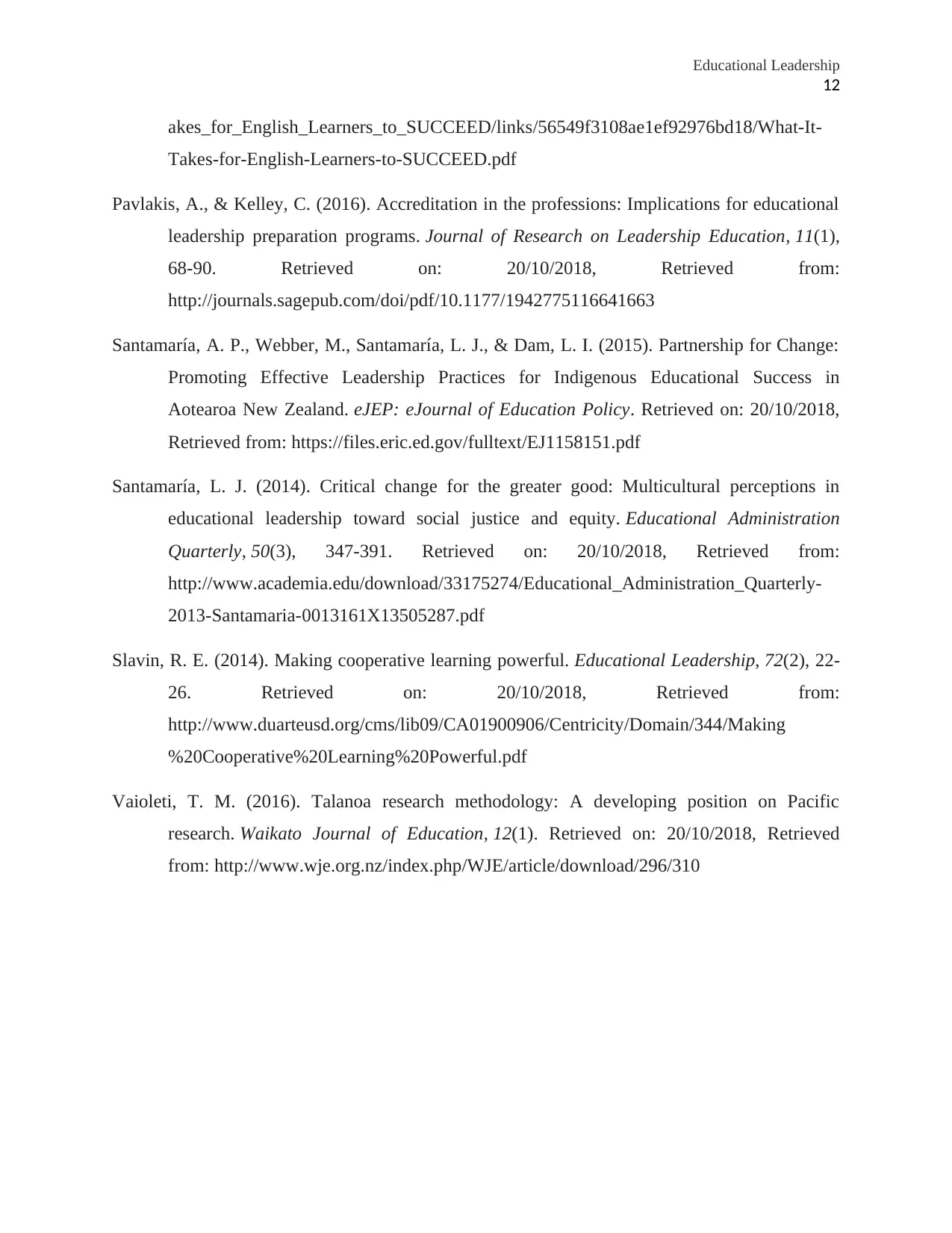
Educational Leadership
12
akes_for_English_Learners_to_SUCCEED/links/56549f3108ae1ef92976bd18/What-It-
Takes-for-English-Learners-to-SUCCEED.pdf
Pavlakis, A., & Kelley, C. (2016). Accreditation in the professions: Implications for educational
leadership preparation programs. Journal of Research on Leadership Education, 11(1),
68-90. Retrieved on: 20/10/2018, Retrieved from:
http://journals.sagepub.com/doi/pdf/10.1177/1942775116641663
Santamaría, A. P., Webber, M., Santamaría, L. J., & Dam, L. I. (2015). Partnership for Change:
Promoting Effective Leadership Practices for Indigenous Educational Success in
Aotearoa New Zealand. eJEP: eJournal of Education Policy. Retrieved on: 20/10/2018,
Retrieved from: https://files.eric.ed.gov/fulltext/EJ1158151.pdf
Santamaría, L. J. (2014). Critical change for the greater good: Multicultural perceptions in
educational leadership toward social justice and equity. Educational Administration
Quarterly, 50(3), 347-391. Retrieved on: 20/10/2018, Retrieved from:
http://www.academia.edu/download/33175274/Educational_Administration_Quarterly-
2013-Santamaria-0013161X13505287.pdf
Slavin, R. E. (2014). Making cooperative learning powerful. Educational Leadership, 72(2), 22-
26. Retrieved on: 20/10/2018, Retrieved from:
http://www.duarteusd.org/cms/lib09/CA01900906/Centricity/Domain/344/Making
%20Cooperative%20Learning%20Powerful.pdf
Vaioleti, T. M. (2016). Talanoa research methodology: A developing position on Pacific
research. Waikato Journal of Education, 12(1). Retrieved on: 20/10/2018, Retrieved
from: http://www.wje.org.nz/index.php/WJE/article/download/296/310
12
akes_for_English_Learners_to_SUCCEED/links/56549f3108ae1ef92976bd18/What-It-
Takes-for-English-Learners-to-SUCCEED.pdf
Pavlakis, A., & Kelley, C. (2016). Accreditation in the professions: Implications for educational
leadership preparation programs. Journal of Research on Leadership Education, 11(1),
68-90. Retrieved on: 20/10/2018, Retrieved from:
http://journals.sagepub.com/doi/pdf/10.1177/1942775116641663
Santamaría, A. P., Webber, M., Santamaría, L. J., & Dam, L. I. (2015). Partnership for Change:
Promoting Effective Leadership Practices for Indigenous Educational Success in
Aotearoa New Zealand. eJEP: eJournal of Education Policy. Retrieved on: 20/10/2018,
Retrieved from: https://files.eric.ed.gov/fulltext/EJ1158151.pdf
Santamaría, L. J. (2014). Critical change for the greater good: Multicultural perceptions in
educational leadership toward social justice and equity. Educational Administration
Quarterly, 50(3), 347-391. Retrieved on: 20/10/2018, Retrieved from:
http://www.academia.edu/download/33175274/Educational_Administration_Quarterly-
2013-Santamaria-0013161X13505287.pdf
Slavin, R. E. (2014). Making cooperative learning powerful. Educational Leadership, 72(2), 22-
26. Retrieved on: 20/10/2018, Retrieved from:
http://www.duarteusd.org/cms/lib09/CA01900906/Centricity/Domain/344/Making
%20Cooperative%20Learning%20Powerful.pdf
Vaioleti, T. M. (2016). Talanoa research methodology: A developing position on Pacific
research. Waikato Journal of Education, 12(1). Retrieved on: 20/10/2018, Retrieved
from: http://www.wje.org.nz/index.php/WJE/article/download/296/310
⊘ This is a preview!⊘
Do you want full access?
Subscribe today to unlock all pages.

Trusted by 1+ million students worldwide
1 out of 12
Related Documents
Your All-in-One AI-Powered Toolkit for Academic Success.
+13062052269
info@desklib.com
Available 24*7 on WhatsApp / Email
![[object Object]](/_next/static/media/star-bottom.7253800d.svg)
Unlock your academic potential
Copyright © 2020–2025 A2Z Services. All Rights Reserved. Developed and managed by ZUCOL.





